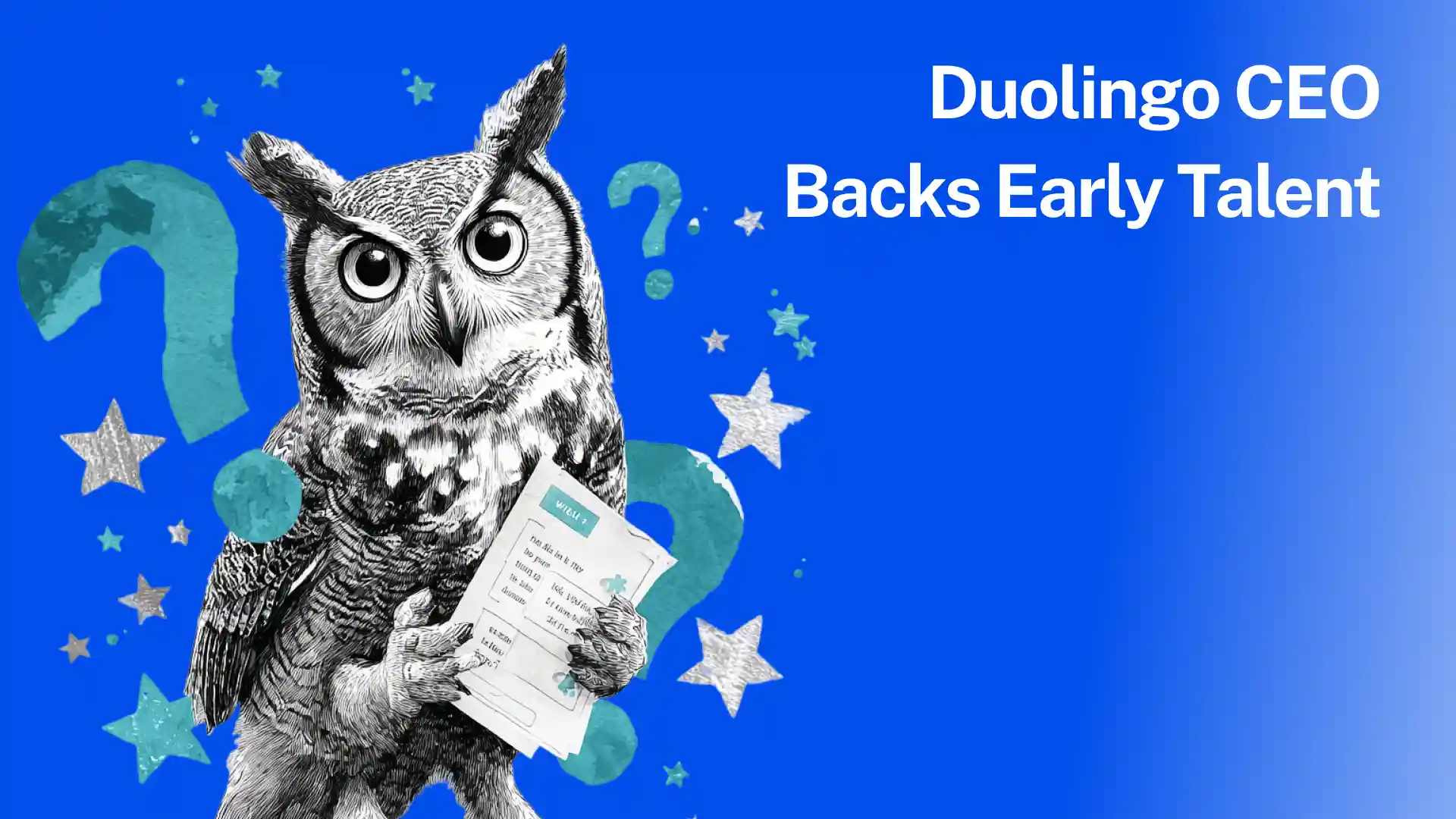

Hi {{ subscriber.first_name | strip | default: "Partner" }},
This week: Duolingo CEO Protects First Jobs
While many companies are shrinking internships and graduate programs, Duolingo CEO Luis von Ahn is doubling down on early-career hires. He sees fresh talent as a long-term growth engine, bringing challenge to old assumptions, native fluency in digital culture, and future leaders who’ve grown inside the company.
We also dive into:
- Curiosity Drives Growth: Sophie Wade shows how growth, servant leadership, and human-centric mindsets help teams adapt faster and succeed in transformation.
- Netflix Masters Dissent: Brian Elliott reveals how memo-driven forums and live feedback create rapid, informed decisions and stronger accountability.
- Super Facilitators Unlock Teams: Equitable participation and trust building turn diverse talent into high-performing collective intelligence.
- AT&T Ends Loyalty Era: CEO memo signals shift to market-based culture and fear-driven management.
- Work Becomes Showbiz: Careers now follow project-based, portfolio-led models driven by AI and global competition.
Let’s get into it 👇
.jpg)
As companies across industries pull back on hiring junior workers, Duolingo CEO Luis von Ahn is taking a bold stand. “If you are really taking the long view and want to build a long-term product and company, hiring new grads is one of the best investments you can make,” he wrote on LinkedIn.
Luis’s view contrasts sharply with the dominant trend in tech and professional services, where AI is reshaping entry-level work and, in many cases, replacing it. But as the job ladder shifts, he believes the smartest companies will be those that keep betting on fresh talent.
- The Bottom Rung Is Breaking: Anthropic CEO Dario Amodei predicts that AI could wipe out half of entry-level white-collar jobs within five years. Data support the claim. Graduate hiring in Big Tech is down 50 percent since 2019. AI systems now automate tasks that used to build experience for junior developers, legal associates, and support staff. Tom Davenport warned that “there is little need for low-skilled or entry-level employees once automated programs are in place,” and that companies risk weakening their own talent pipeline by not developing future experts.
- Duolingo's Culture of Growth: At Duolingo, early career employees are empowered. “They have not been told certain things cannot work, so they make them work,” Luis wrote. In a Stanford Business interview, he explained how AI allows new hires to offload routine work and spend time on more creative, high-leverage tasks. Entire products, like the company’s new chess course, were prototyped by team members with no prior experience in chess or coding, guided by AI tools.
- AI Fluency Is the New Baseline: Instead of eliminating early roles, companies can reshape them. I previously suggested that entry-level positions must evolve into AI-native roles. Graduates should be hired not only for curiosity, but also for their ability to prompt, build, and work alongside AI. Tom Davenport agrees. He urges young professionals to develop a digital mindset, use AI actively and critically, and pair it with deep subject knowledge to stay competitive.
The Bottom Line
“I don’t want to look back in 5 years and think: Why didn’t we bet on early talent when everyone else was scared?” wrote Duolingo CEO Luis von Ahn.
While much of the conversation around AI focuses on what it replaces, there is another reality unfolding. Young people are still graduating, still taking their first steps into the working world. They deserve a chance to contribute, to learn, and to grow. And you may be surprised—some of them will bring fresh perspectives and bold ideas precisely because they are not limited by what the industry says is possible.
📝 Prompt
This quarter, identify one entry-level role that has been reduced or paused due to AI or automation. Reframe it as an “AI-enhanced” junior role by:
- Defining what AI tools the role will use
- Pairing the new hire with a mentor for context and support
- Tasking them with building or improving one AI workflow in their first 30 days
Start small. But start now. Early talent will grow with your systems, your tools, and your culture.
Your Friday Briefing on the Future of Work
Future Work delivers research-backed insights, expert takes, and practical prompts—helping you and your team capture what matters, build critical skills, and grow into a future-ready force.
Get all-in-one coverage of AI, leadership, middle management, upskilling, DEI, geopolitics, and more.
Unsubscribe anytime. No spam guaranteed.
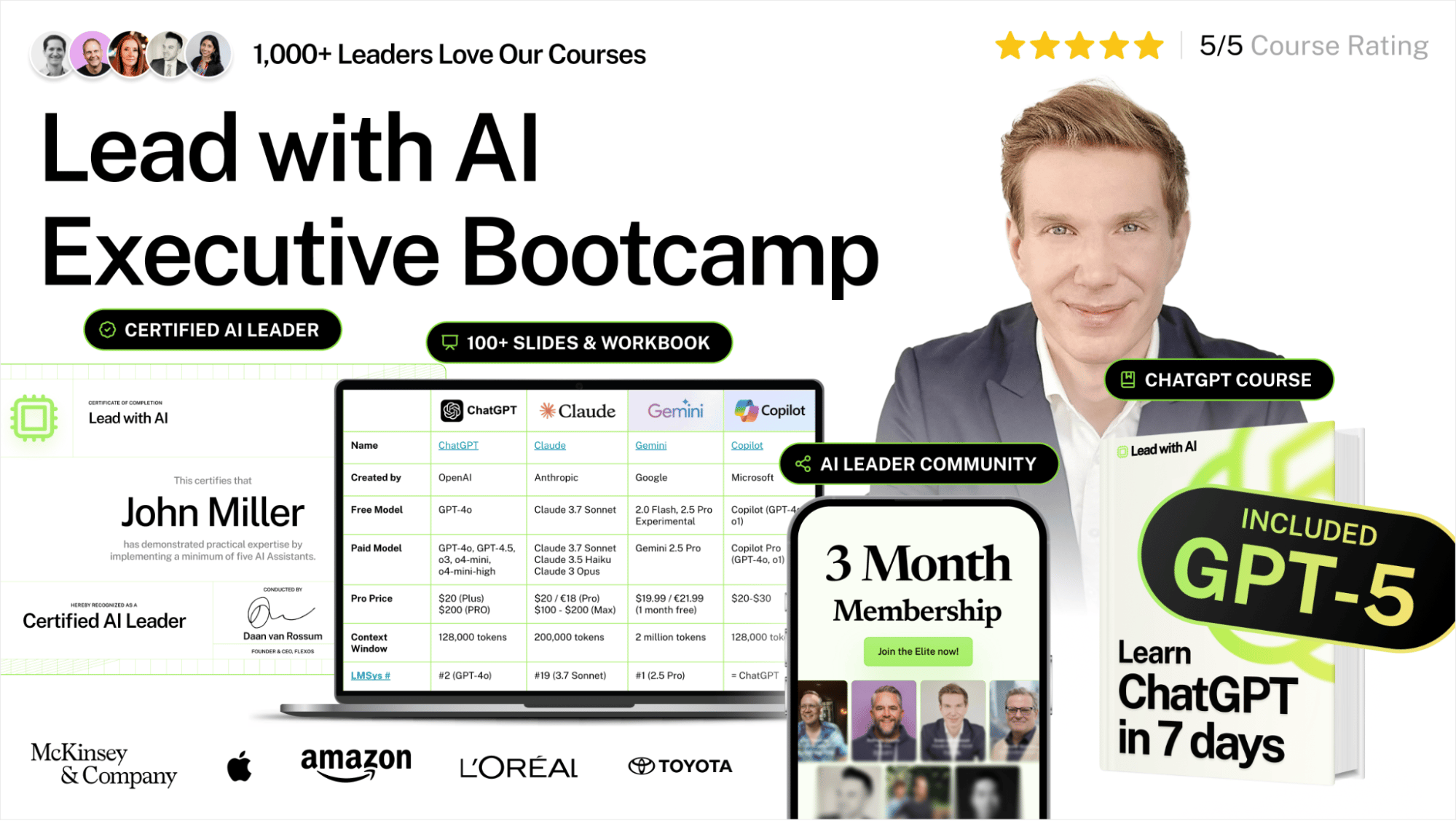
👉 Join the only hands-on executive AI program.
In Lead with AI, you’ll get hours of personal coaching from me as we build 5+ custom AI assistants together with a cohort of global peers, and completely transform within 3 weeks.
Join now, and you also get $1,783 worth of bonuses:
- 3 Months of the Lead with AI PRO Membership (worth $87)
- AI Implementation Blueprint ($499) - All your must-have AI tutorials
- AI Certification Program: Guaranteed Implementation Success ($199)
- ChatGPT in 7 Days (worth $99) – including ChatGPT 5 deep-dive Course
- 12-Month Refresher Pass – take a future cohort at no cost (worth $899)
- 100% Money-Back Guarantee
The program is updated for August 2025, now covering GPT-5, ChatGPT Agents, and your enterprise AI stack (ChatGPT, Copilot, or Gemini).
Reserve your seat for the August 22 or October 3 cohort today!
I keep a close eye on what Future Work Experts are thinking, saying, and questioning. I break down the key conversations and brainstorm practical steps we can take to move forward.
This week:
MINDSET SHIFT
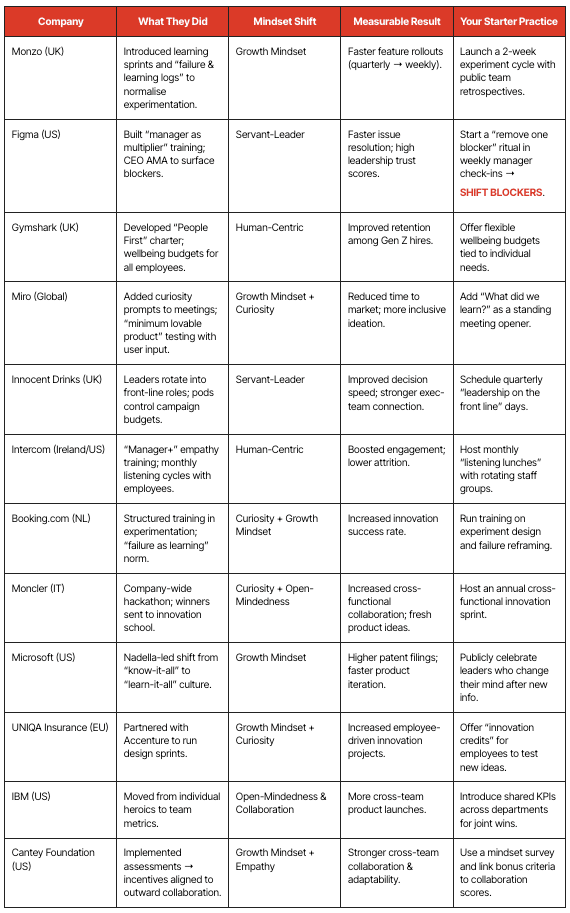
Sophie Wade: Growth Starts with Curiosity
- Curiosity-driven mindsets—Growth, Servant-Leadership, and Human-Centric—equip leaders and teams to adapt rapidly, reduce stress, and sustain transformation in highly digitalized, fast-changing environments.
- Data shows 89% of senior leaders see growth mindset as critical for future success, servant-leadership boosts creativity and resilience, and human-centric approaches make organizations 2.6x more likely to succeed in transformation.
- Shift enablers include psychological safety, continuous learning, transparent leadership, and reward systems that model and reinforce curiosity, empathy, and adaptability across all levels.
📝 Prompt: In your next meeting, ask one curiosity-based question that invites your team to explore possibilities rather than confirm assumptions—then listen without steering the answer.
CULTURE SCALING
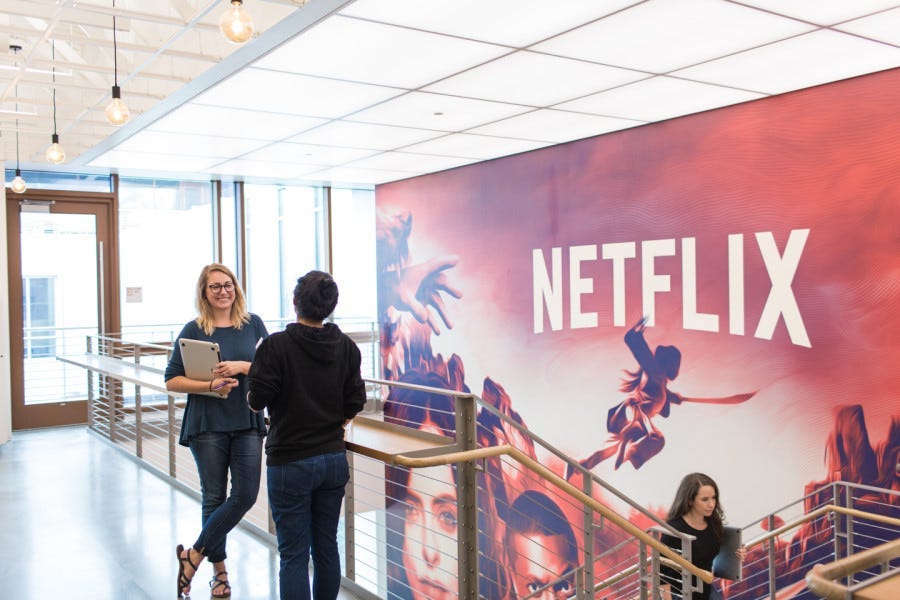
Brian Elliott: Inside Netflix’s Culture Machine
- Netflix’s farming for dissent practice uses memo-driven forums like Product Strat to surface disagreements before an informed captain makes the final call, enabling rapid and informed decisions.
- Continuous feedback systems, including “Live 360s,” treat criticism as a gift, building accountability and modeling growth through public leader reflections.
- Global expansion balances consistency and local adaptation, with cultural education (e.g., The Culture Map) helping leaders tailor strategies to diverse markets.
📝 Prompt: Before your next major decision, actively seek out one perspective you know will challenge your own—and invite that person to share it in front of the team.
NEW MANAGER PLAYBOOK
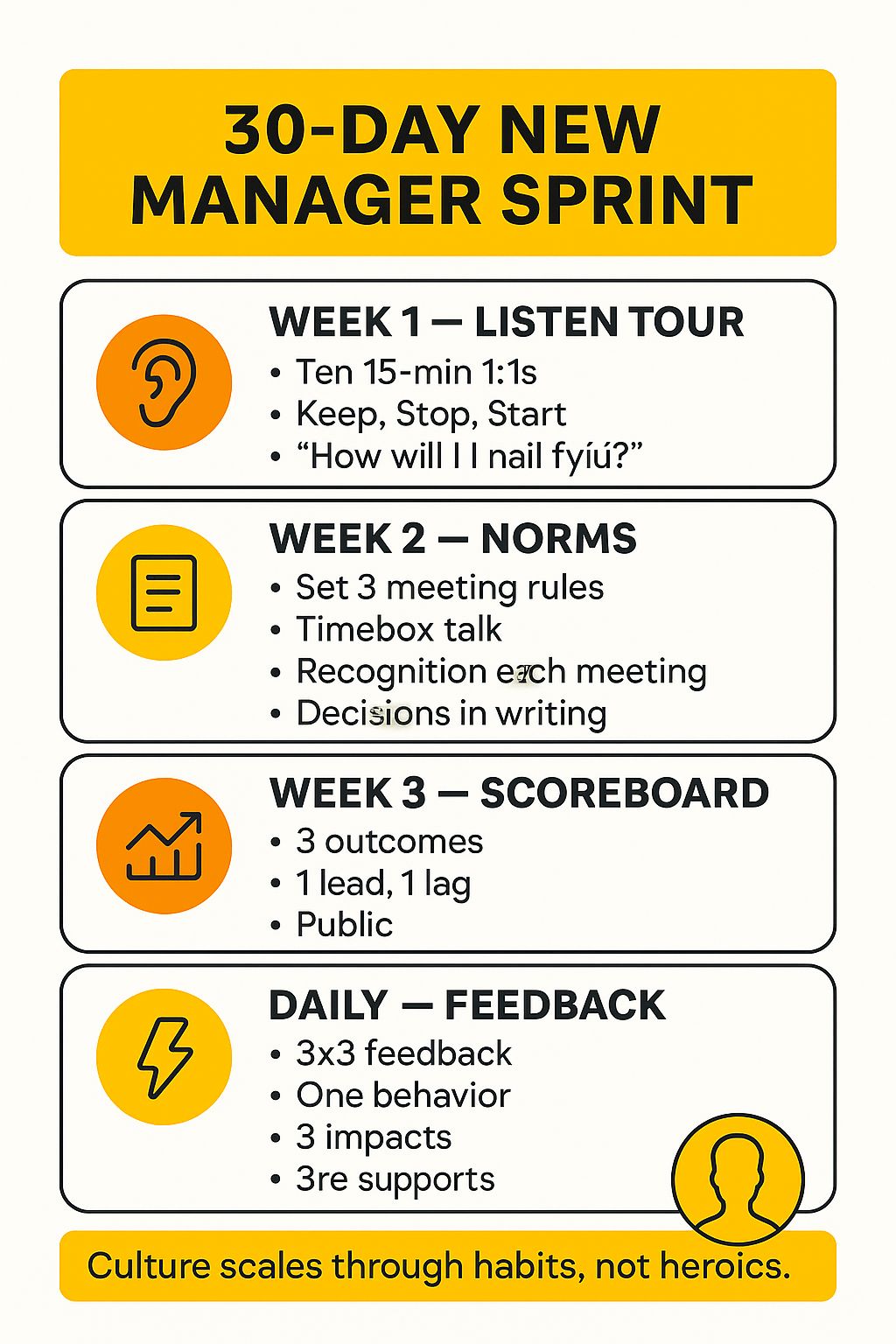
Chris Dyer: Your First 30 Days, Done Right
- Week 1–4 plan: Listen Tour (10×15-min 1:1s), set meeting Norms, create a Scoreboard with lead/lag metrics, and implement structured Feedback (3×3 method).
- Daily focus: One power hour, plus end every meeting with a clear commitment and owner.
- No budget required, success relies on behavioral discipline, clarity, and consistent follow-through.
📝 Prompt: If you inherited a team today, start tomorrow by scheduling 10 short 1:1s to ask two questions: what to keep/stop/start, and how you might fail them—then act on what you hear.
🔥 QUICK HITS:
(SECURITY HOSPITALITY) Phil Kirschner: When Safety Meets Hospitality
- Modern security teams face a dual mandate—protect against threats while providing hospitality-level service—made harder by mixed-use environments and permeable boundaries.
- Effective support requires clear guidelines, integrated training (de-escalation + customer service), and metrics that value both safety and brand experience.
- Cross-functional collaboration between real estate, HR, and security vendors ensures guards are empowered as both protectors and ambassadors without resorting to draconian measures.
📝 Prompt: Walk through your building today and ask a security team member what situations are hardest to balance between safety and service, then work with them on one small fix.
(ENGAGEMENT & WELLBEING CRISIS) Josh Bersin: Why Engagement Is Collapsing
- Engagement crash: Only 21% of workers and 27% of managers are engaged; 66% are “suffering,” andthe US happiness rank fell from 15th to 24th.
- Causes: AI-driven job fears (86% feel fear at work), loss of flexibility, declining social support, and rising corruption perception; young managers are hit hardest.
- Solutions: Shift from financial-first to human-first, invest in development and recognition, ensure pay fairness, enable role mobility, and practice human-centered leadership.
📝 Prompt: Today, thank three people on your team, specifically naming the impact of their work, and ask one what skill they’d like to develop this quarter.
(RECIPROCITY & THE FUTURE OF WORK) Jess Von Bank: Why Reciprocity Wins
- The old work contract—time for pay, fixed roles, top-down control—is collapsing in today’s fluid, skills-driven, multi-stakeholder environment.
- The new value exchange demands mutual benefit: people bring skills, creativity, and adaptability; organizations offer opportunity, flexibility, and purpose. Trust becomes the core operating system.
- Reciprocity is structural, not sentimental: it requires clear give-and-get agreements, willingness to rebalance, and recognition that value is co-created, not extracted.
📝 Prompt: Write down what your organization gives—and gets—from people today. Ask your team to do the same. Compare and discuss where the deal needs to evolve.
I track what’s worth your attention—bringing you the news and updates that matter most to how we work, lead, and grow.
This week:
SUPER-FACILITATOR LEADERSHIP

Turning Talent into Collective Intelligence
- Super-facilitators integrate diverse expertise, promote equitable contributions, and build trust, creating collective intelligence—the group’s ability to reason, innovate, and solve problems.
- Research shows team success depends less on individual IQ and more on meta-talent: empathy, equitable turn-taking, and role-crafting that harness each member’s unique strengths.
- Practices like attunement, earned trust, and catalytic questions (as used in Pixar’s Brain Trust) turn teams into high-performing “superorganisms” capable of solving harder problems over time.
📝 Prompt: At your next team session, map the flow of ideas—who starts them, who builds on them, and who is left unheard—then intentionally design moments for every voice to shape the final outcome.
BROKEN LOYALTY
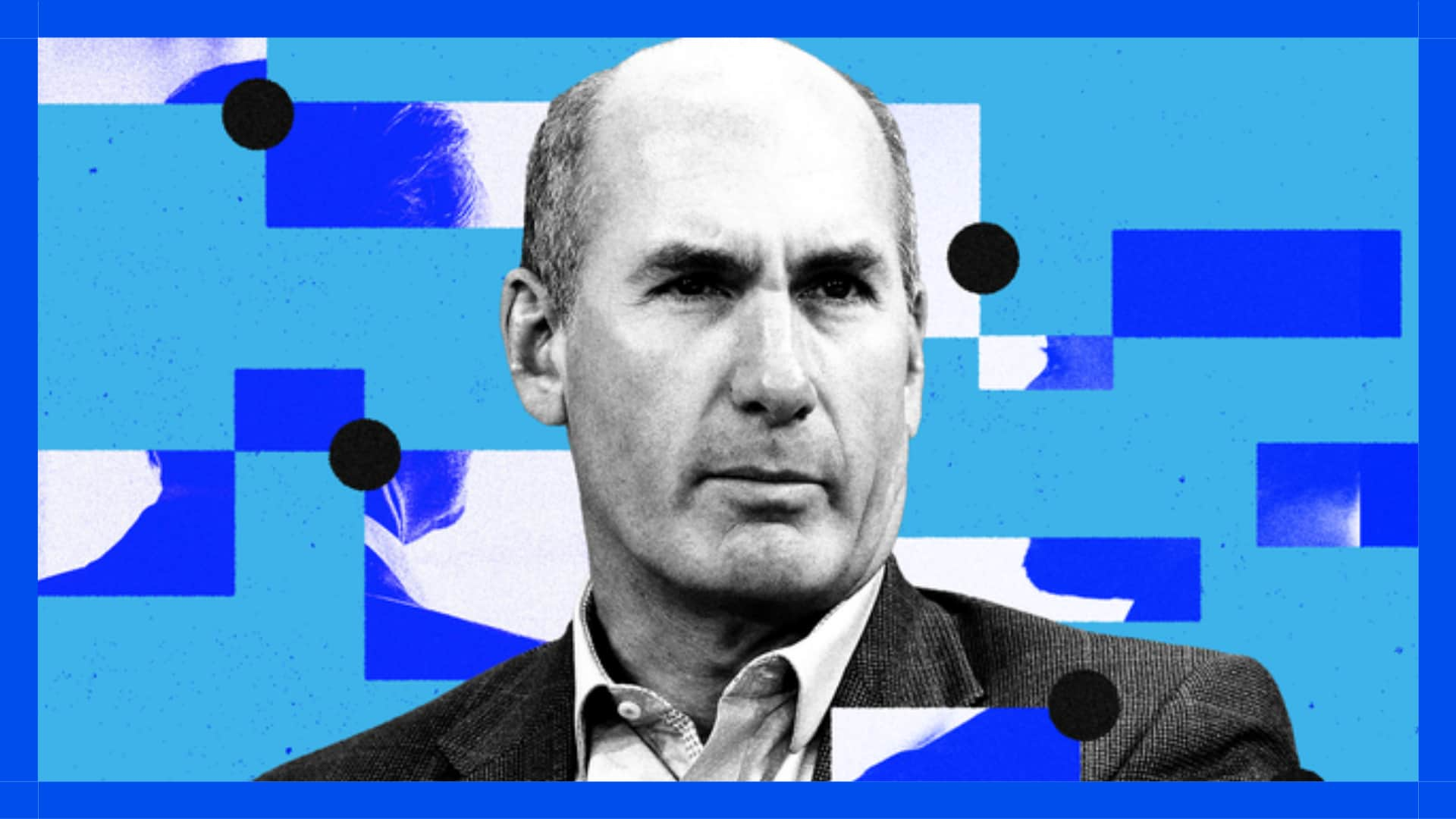
AT&T CEO Declares Loyalty Dead
- AT&T CEO John Stankey’s memo ends the “familial” employment deal, rejecting expectations like tenure-based promotions, remote flexibility, and mutual loyalty.
- Signals a broader shift to market-based culture and management by fear, fueled by a white-collar recession and AI-driven downsizing.
- Research shows fear-based leadership erodes creativity, innovation, and retention—especially when companies don’t match employee dedication with equal commitment.
📝 Prompt: Ask your team to share one change—big or small—that would make them feel more valued and supported at work, then commit to acting on at least one within the next month.
SHOWBIZ CAREERS

Why Work Feels Like Hollywood Now
- Linear careers are giving way to project-based, portfolio-driven, and reputation-led models—similar to how actors and producers build careers.
- Driven by AI commoditising knowledge work, unpredictable skill needs, and remote-enabled global talent competition.
- Success now relies on constant experimentation, crafting compelling career stories, and building networks as career infrastructure.
📝 Prompt: Identify one high-impact project your team could deliver in the next 3 months that would strengthen your collective reputation in the market, and map how each member’s skills—current or emerging—can be showcased through it.
HR+IT

HR and IT: Merging Ahead
- 94% of senior IT leaders expect combined departments in the next digital transformation wave; 64% foresee HR–IT mergers within five years to boost productivity, engagement, and retention.
- Top priorities: automation and AI, IT onboarding/offboarding, digital training, workforce analytics, and digital employee experience (DEX) management.
- Key hurdles: unclear ownership (58%), poor communication (50%), differing priorities (49%); solutions include joint pilots, XLAs, and digital dexterity programs.
📝 Prompt: Imagine your HR and IT teams as one unified function. What would you redesign today to remove friction, amplify employee capability, and prepare your workforce for AI-driven change?
AI LEADERSHIP PRINCIPLES

What Zuckerberg’s AI Vision Means for Leaders
- Mark Zuckerberg’s AI vision focuses on personal superintelligence, making personalization and empowerment as vital for workplaces as for tech.
- Personalization means systems adapt to individual preferences, workflows, and growth needs, giving a sustained talent edge over one-size-fits-all processes.
- Empowerment requires structural support—clear decision rights, seamless communication, and trust—removing bottlenecks so people can lead from anywhere.
📝 Prompt: If every person on your team had their own AI-powered superintelligence, how would you redesign work to personalize growth, remove bottlenecks, and give them the freedom to lead from anywhere?
🔥 QUICK READ:
- Sam Altman’s 24-Hour Pivot: OpenAI launched its newest ChatGPT and announced older versions would be retired — then reversed the decision within a day after user backlash. The move sparked debate: was it nimble responsiveness or overreaction to social media? With no hardware recalls or refunds needed, the rollback was more a marketing misstep than a costly failure.
- Robots Step In Where Workers Won’t: U.S. manufacturers face a stubborn labor gap—many Americans simply don’t want factory jobs. In sectors like solar installation, where 44% of employers struggle to find qualified workers, companies are deploying robots to keep projects on track. Civ Robotics’ surveying systems can place over 1,000 markers a day—triple the human rate—while DHL is investing $744M in warehouse robots and Chinese firms are rolling out humanoid units for heavy-duty tasks.
- Caught Between Trump and Putin: Amid battlefield setbacks and an anti-corruption backlash that has dropped public trust from 65% to 58%, Zelenskyy is excluded from upcoming Trump–Putin talks over Ukraine’s fate in Alaska. Kyiv fears being forced into territorial concessions barred by its constitution, while US signals waver with suspended weapons and intelligence sharing. European leaders offer diplomatic cover to uphold Ukraine’s red lines: no land cession, full involvement in talks, and security guarantees.
Your Friday Briefing on the Future of Work
Future Work delivers research-backed insights, expert takes, and practical prompts—helping you and your team capture what matters, build critical skills, and grow into a future-ready force.
Get all-in-one coverage of AI, leadership, middle management, upskilling, DEI, geopolitics, and more.
Unsubscribe anytime. No spam guaranteed.

